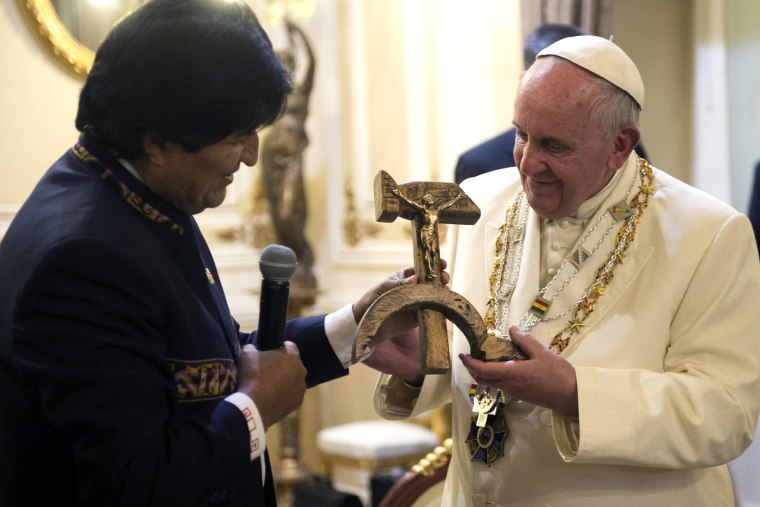Pope Francis avoided altitude sickness in La Paz, Bolivia, but he may have woken Thursday with a ringing headache anyway.
The day before Bolivian president Evo Morales gave Francis a large garish cross carved into the shape of a hammer and sickle – the symbol of Communist unity between workers and farmers.
That’s a bit bang-on-the-nose for his holiness, who has been branded a Marxist by Rush Limbaugh, and dogged by claims that he is a radical with dreams of toppling the global economy.
Related: Did the Pope just sample cocaine?
To be fair, a communist is typically defined as a member of the party, which denies the existence of God. That's not Francis. But the pope is indeed a bit of a radical with dreams of a fairer global economy. In a much-anticipated papal letter released by the Vatican last month, he warned “every living person on this planet” about the reckless pursuit of infinite growth and boundless, buyable pleasures.
He diagnosed it as “the deification of the market,” and argued that if we hope to flourish, we need “a bold cultural revolution” in the way we live and work. But by Thursday morning, Francis was busy pushing back on the c-word.
“When I talk about this, some people think the pope is a communist,” he told a gathering of peasants and workers, according to the Associated Press. “They don't realize that love for the poor is at the center of the Gospel.”
Still, the pope is expected to return to his market-based criticisms on Thursday in Bolivia, when he attends a second annual gathering of “popular movements” in the poor, environmentally fragile country. He is also likely to criticize President Morales, who despite socialist leanings and a pope-like appreciation for Mother Nature, has a mixed record on the environment.
Bolivia contains the eastern side of Lake Titicaca, which now has an eye-watering smell that stems from what more adolescent readers might assume is in the water anyway: human feces.
Thousands of destitute workers lack basic sanitation on the shores of the rivers that feed the lake. Clean-ups happen, especially near the tourist town of Copacabana. But experts compare these periodic swabs to wiping the puss from a wound without ever addressing the source of the injury.
Related: Pope Francis receives raucous welcome in South America
Bolivia is also sitting on 48 trillion cubic feet of shale gas. And Morales seems poised to start fracking it very soon. In 2010, he declared that “mother earth” has a right to life, to freedom from pollution and, most controversially, “to not be affected by mega-infrastructure and development projects.”
More recently, however, Morales has been tip-toeing away from those promises. He plowed a ribbon of asphalt through a nature preserve and engineered an economic boom based on high prices for minerals. Bolivia’s state oil and gas company, meanwhile, is studying potential fracking sites and at least one bout of something called “minifracking” has already occurred, according to an energy report released in 2013.
Perhaps the pope can slow these changes, but although Bolivia is overwhelmingly Catholic, Morales recently rewrote the constitution to make the country officially secular. The pope can’t be pleased.
“Whatever is fragile, like the environment, is defenceless before the interests of a deified market,” he wrote in his encyclical.
In Bolivia the market may be the only rule.
